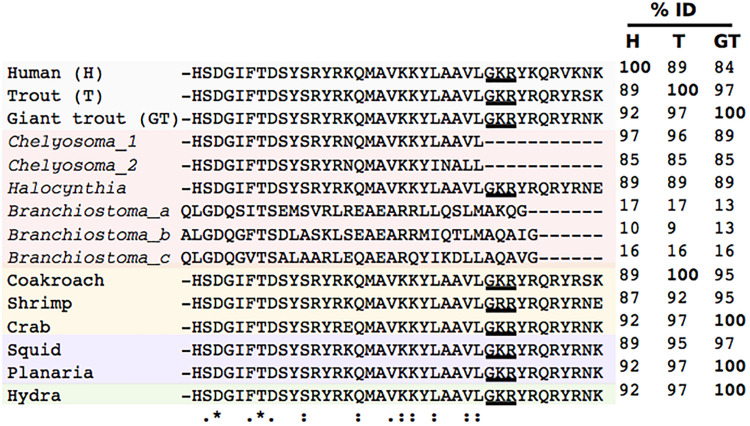FIGURE 2.
Sequence conservation of the invertebrate PACAP mature peptides. The mature sequence of the invertebrate peptides were extracted and compared with PACAP from the human (P18509) and two Salmonidae fish the river trout (Salmo trutta, XM_029756051.1) and the Siberian giant trout (Hucho taimen, HAGJ01147357.1) peptide homologs. The post-translational internal cleavage–amidation site (Gly28-Lys29-Arg30) that generates the shortest peptide isoform (PACAP-27) in human, which is predicted in the other peptide sequences is underlined. The percentage of amino acid sequence identity (%ID) for the human (H), river trout (T), and Siberian giant trout (GT) mature PACAP-38 peptides is given. The vertebrate, hydra, protostome and invertebrate deuterostome mature peptide sequences were used to interrogate the protozoan, non-bilaterian, protostome and invertebrate deuterostome genomes and transcriptomes for homologs. Accession numbers of the non-vertebrate peptides are: cockroach (Periplaneta americana, AB083652), crab (Eriocheir japonica, AB121765), squid (Sepioteuthis lessoniana, AB083651), planarian (Dugesia japonica, AB083649), and hydra (Hydra magnipapillata, AB083650). The tunicate Chelyosoma productum (Chelyosoma-1 and Chelyosoma_2, were obtained from McRory and Sherwood, 1997) and the shrimp (Litopenaeus vannamei) from Lugo et al. (2013). Complete amino acid conservation is annotated with “*”, partial conservation with “.” and the position of the consensus amino acids conserved in the greatest number of sequences is indicated with “:”.

